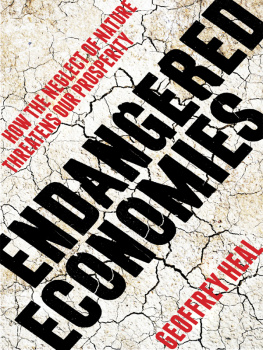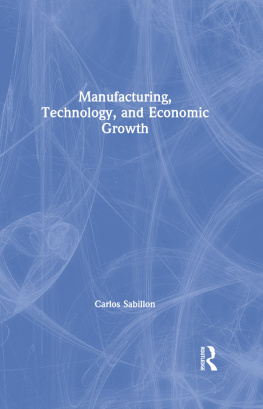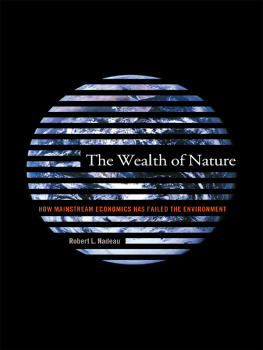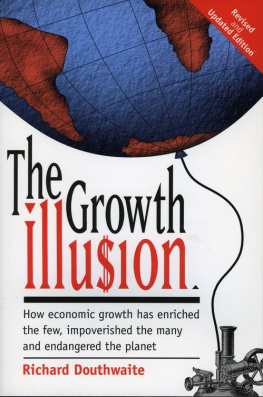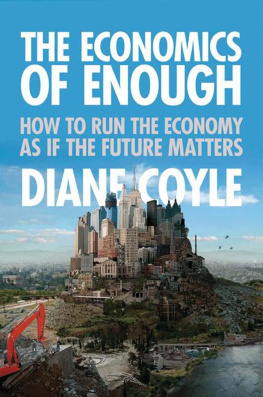Table of Contents
ENDANGERED ECONOMIES
GEOFFREY HEAL
ENDANGERED ECONOMIES
How the Neglect of Nature Threatens Our Prosperity
COLUMBIA UNIVERSITY PRESS
NEW YORK
Columbia University Press
Publishers Since 1893
New York Chichester, West Sussex
cup.columbia.edu
Copyright 2017 Geoffrey Heal
All rights reserved
E-ISBN 978-0-231-54328-6
Library of Congress Cataloging-in-Publication Data
Names: Heal, G. M., author.
Title: Endangered economies: how the neglect of nature threatens our prosperity / Geoffrey Heal.
Description: New York: Columbia University Press, [2016] | Includes bibliographical references and index.
Identifiers: LCCN 2016033451 | ISBN 9780231180849 (cloth: alk. paper) | ISBN 9780231543286 (e-book)
Subjects: LCSH: Sustainable development. | Economic developmentEnvironmental aspects. | Climatic changesEconomic aspects. | Environmental policyEconomic aspects.
Classification: LCC HC79.E5 H428 2016 | DDC 338.9/27dc23
LC record available at https://lccn.loc.gov/2016033451
A Columbia University Press E-book.
CUP would be pleased to hear about your reading experience with this e-book at .
Jacket design: Marc Cohen
To Ann Marie
CONTENTS
I love the natural world, and I love the fruits of economic and technological progress. There are those who say that I cant have both: that economic progress comes at the expense of the natural world and conservation at the expense of progress. Fortunately, this is wrong: not only can they go together, but in the long run, they must go together. We cannot have sustainable prosperity without the natural world: it provides infrastructure essential to our well-being.
Why is conventional wisdom so wrong? Because historically there has been a conflict between economic progress and nature, with the former coming at the expense of the latter. But this is a historical coincidence stemming from the way in which we have organized our economic activity and not in any way a logical necessity. Wehumanitycan certainly have progress without the destruction of nature: it is a matter of organizing our economic activity more thoughtfully. My aim here is to explain why economic progress and conservation of the natural world must go together, and how to reorganize our economic activities so as to make this possible.
This book has taken a long time to write: I now dont fully remember when I started it, probably about 2010. I almost gave up the project when my youngest daughter Natasha died, but eventually realized that she would have wanted it completed. In some sense, I have been writing this book all my life: Ive been a bird watcher and naturalist ever since I can remember, a keen nature photographer since I was at secondary school, and Ive studied physics and economics: reconciling economic and technological progress with the conservation of nature brings all these parts of my life together.
My interests in nature and in technology and economics certainly come from my parents, both trained scientists sharing a life-long devotion to the natural world. On his retirement, my father moved from directing British Nuclear Fuels Ltd. to chairing the Dyfed Wildlife Trust and the Campaign for the Protection of Rural Wales: he too combined technology and conservation in his life.
I owe a major debt to my wife Ann Marie, who has been invaluable not only in providing support and encouragement and tolerating my obsession with completing this volume, but also in editing drafts and critiquing the clarity and persuasiveness of the writing, and in many cases improving it.
In preparing this volume, I have had exceptional help from Columbia University Presss editor Bridget Flannery-McCoy, encouragement and support from Myles Thompson of Columbia Business School Publishing and Kathy Robbins of the Robbins Office, and assistance in assembling and editing materials from Nancy Brandwein. I am grateful to them all.
I ve gradually noticed the natural world disappearing, being destroyed bit by bit: woodlands vanishing, birds and butterflies that I knew in my youth ever harder to find, wildflowers rarer and rarer. Hard and depressing statistics confirm these subjective impressions on the vanishing natural world and the increasingly tenuous life of many species. The experience of my friend and colleague Don Melnick, a professor of ecology, emphasizes this point: having spent much of his career studying orangutans, he realized the population of these amazing great apes was crashing, and that unless he and others acted, the species to which he has devoted his life would be extinct.
The collapse of the natural world has always struck me as a tragic loss, but it took me many years to make the connection to my own profession, economics. I saw that economics itselfeconomic activity, peoples need to make a living, to farm, to build homeswas driving the collapse of the natural world. But I also saw that economics could restore the natural world to some of its past grandeur. The reason is simple, though perhaps surprising in a world where we have been told to think of the environment as luxury: We need the natural world. We depend on it, and without it, our prosperity is illusory.
Economics is about the efficient use of scarce resources, and much of what nature provides us is scarce and importantair to breathe, water to drink, a productive climate, and food to eat. We need to think economically about these now scarce but vital natural assetsthe remaining chapters show how to do just that.
The prosperity of any country is bound up with the health of its natural environment. National economies are linked in a complex dance with the forests, aquifers, coastlines and oceans, beetles and birds, and teeming life above and below the earths surface. A web of intricate relationships between very different worlds links business and beehives, productivity and pollution, food and fisheries. Largely unwatched and unbidden, our economic world and Mother Natures world silently collide to determine our economic fortune. Though not widely understood or appreciated, natures contribution to economic success is enormous.
Examples of natures contributions abound. Nature adds economic value through pollination by insects, birds, and bats. Pollination is essential to agricultureabout one-third of our food would not be produced without it. Nature adds economic value through increased agricultural productivity from higher-yielding crops derived from other naturally occurring plant varieties. Nature adds economic value through watersheds and aquifers, providing direct benefits to agriculture and industries dependent on clean water. Nature adds economic value through hydropower, one of the cleanest and most reliable sources of electricity.
We can destroy economic value by damaging the environment, and in the process harm the health of our citizens and diminish their productivity. A striking illustration comes from California, one of the richest regions in the world, whose prosperity is based on technology (Silicon Valley), entertainment (Hollywood), and high-value agriculture (wine, fruit, and vegetables). A recent study shows that higher concentrations of ground-level ozone pollution reduce the amount of fruit and vegetables picked per hour by agricultural workers: more ozone makes it more difficult for workers to breathe and reduces their productivity noticeably.

